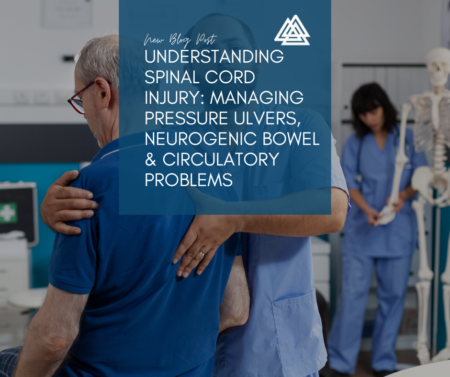 Spinal cord injuries (SCI) can lead to a range of complications that significantly impact the quality of life. Among the most common and challenging issues are pressure ulcers, neurogenic bowel, and circulatory problems. Proper management and preventive measures are crucial in addressing these concerns and improving the overall well-being of individuals with SCI.
Spinal cord injuries (SCI) can lead to a range of complications that significantly impact the quality of life. Among the most common and challenging issues are pressure ulcers, neurogenic bowel, and circulatory problems. Proper management and preventive measures are crucial in addressing these concerns and improving the overall well-being of individuals with SCI.
Pressure Ulcers: Prevention and Care
Pressure ulcers, also known as bedsores, are a significant concern for individuals with SCI due to prolonged immobility. These ulcers develop when constant pressure on the skin reduces blood flow to the area, leading to tissue damage. Without proper care, pressure ulcers can become severe and lead to serious infections.
Prevention is the best approach. Regular repositioning, using specialized cushions and mattresses, and maintaining good skin hygiene are essential. The Mayo Clinic advises, “Frequent changes in position and attention to skin care are critical for preventing pressure ulcers in individuals with spinal cord injuries.”
If pressure ulcers do develop, early intervention is key. Treatment may involve wound care, debridement, and, in some cases, surgery. Consulting a healthcare professional for personalized care is vital in managing these ulcers effectively.
Neurogenic Bowel: Management Strategies
Neurogenic bowel is a common issue following SCI, where the normal function of the bowel is disrupted due to nerve damage. This condition can lead to constipation, incontinence, and other bowel-related issues. Managing neurogenic bowel requires a consistent bowel program tailored to the individual’s needs.
A regular bowel regimen that includes scheduled toileting, dietary adjustments (such as increased fiber and fluid intake), and the use of medications or suppositories can help manage symptoms. According to the Christopher & Dana Reeve Foundation, “Developing a consistent bowel program is essential in maintaining bowel function and preventing complications in individuals with SCI.”
It’s also important to stay in close communication with healthcare providers to adjust the bowel program as needed, ensuring it remains effective over time.
Circulatory Problems: Risks and Prevention
SCI can also lead to circulatory problems, such as deep vein thrombosis (DVT) and poor blood circulation, due to prolonged immobility and changes in the autonomic nervous system. These issues increase the risk of blood clots, swelling, and other cardiovascular complications.
Preventive measures include regular movement and exercises, compression stockings, and medications to prevent blood clots. The American Heart Association emphasizes, “Maintaining circulation through regular movement and preventive measures is crucial for individuals with SCI to reduce the risk of circulatory complications.”
Monitoring for symptoms such as swelling, pain, or changes in skin color, particularly in the legs, is important. Early detection and treatment of circulatory issues can prevent serious health problems.
Living with a spinal cord injury presents unique challenges, particularly concerning pressure ulcers, neurogenic bowel, and circulatory problems. However, with proactive management and the right care strategies, these complications can be minimized, allowing individuals with SCI to lead healthier and more fulfilling lives. Partnering with healthcare providers, staying informed, and adhering to preventive measures are key to effectively managing these common issues.
